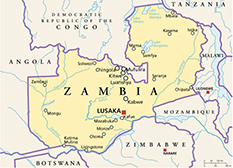Performance Evaluation of Zambia’s Innovation Grant Program
Lusaka, Zambia faces many challenges with regard to water supply, sanitation, and waste management. This is especially true for residents of peri-urban areas, where many of the city’s poorest and most vulnerable people reside. The city’s water supply, sanitation, and drainage system was constructed in the 1960s and 1970s and is outdated, dilapidated, and unable to meet current or future demand, because Lusaka is home to 1.8 million people and is projected to have close to five million residents by 2035.
The Millennium Challenge Account-Zambia
The Millennium Challenge Account (MCA)-Zambia supports the implementation of water supply, water quality, sanitation, and hygiene interventions under the Lusaka Water Supply Sanitation and Drainage Project (LWSSD). The objective is to expand access to, and improve the reliability of, water supply and sanitation, and to improve drainage services in select urban and peri-urban areas of the city of Lusaka. The program logic suggests that these improvements will in turn decrease the incidence of waterborne and water-related diseases (such as diarrhea), generate time savings for households and businesses, and reduce nonrevenue water in the water supply network.
The project focuses specifically on investments in (1) infrastructure development and rehabilitation, and (2) the provision of technical assistance to the Lusaka Water and Sewerage Company (LWSC; the provincial utility responsible for the management of Lusaka’s WASH assets and the provision of WASH services) and the Lusaka City Council (LCC; the government entity that manages the city’s drainage infrastructure and services). The technical assistance component includes the Innovation Grants Program (IGP), of which AIR is conducting a performance evaluation.
Evaluation Details
 AIR was contracted by the Millennium Challenge Corporation (MCC) to conduct a five-year performance evaluation of MCA-Zambia’s IGP focusing on the grant facility’s implementation, stakeholder perceptions of the program, and relation to other components of the MCA-Zambia Compact. AIR’s work with MCC and MCA related to the IGP includes two other components as well (evaluability assessments of grant proposals and evaluations of individual awarded grants) however, those activities are separate from the performance evaluation of the IGP. The performance evaluation of the IGP will generate evidence to help MCA learn what aspects of the IGP are working well and identify areas that could be improved. We will establish the fidelity of grant program implementation along various dimensions, including the grant announcement and associated communication efforts (and the initial call for concept notes), the extent to which grants were awarded according to program priorities, and the extent to which grants were managed and grantees were supported effectively.
AIR was contracted by the Millennium Challenge Corporation (MCC) to conduct a five-year performance evaluation of MCA-Zambia’s IGP focusing on the grant facility’s implementation, stakeholder perceptions of the program, and relation to other components of the MCA-Zambia Compact. AIR’s work with MCC and MCA related to the IGP includes two other components as well (evaluability assessments of grant proposals and evaluations of individual awarded grants) however, those activities are separate from the performance evaluation of the IGP. The performance evaluation of the IGP will generate evidence to help MCA learn what aspects of the IGP are working well and identify areas that could be improved. We will establish the fidelity of grant program implementation along various dimensions, including the grant announcement and associated communication efforts (and the initial call for concept notes), the extent to which grants were awarded according to program priorities, and the extent to which grants were managed and grantees were supported effectively.
The performance evaluation will rely on a mix of qualitative and quantitative data. Qualitative data will come from interviews and focus groups with selected respondents (successful and unsuccessful IGP applicants; LWSC; LCC; IGP staff) and quantitative data will include a brief survey for concept note and proposal workshop participants as well as data collected by Innovation Grant Program Manager (IGPM) for monitoring and budgeting purposes. Additionally, we collect information on perceptions of the program using formative and summative in-depth interviews with stakeholders, focusing on participation in the program and health and economic benefits.

